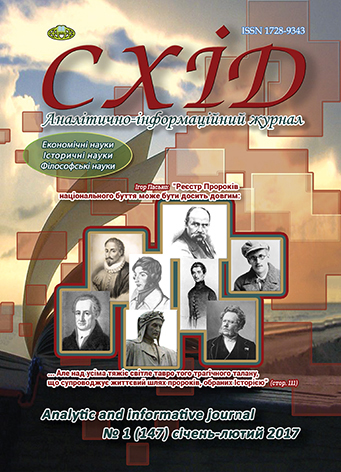Theoretical foundations, condition and practice of development of payment systems in Ukraine
DOI:
https://doi.org/10.21847/1728-9343.2017.1(147).96836Keywords:
payment systems, development of payment systems, principles of payment systems, large-value payment systems, card payment systems, electronic money, express money transfers systemAbstract
In modern conditions payment systems have an important role in the economy, as they must provide effective economic means of payments. Accordingly, the development of payment systems in Ukraine appears as a relevant theoretical and practical problem.
In the article the theoretical basis and features of payment systems in Ukraine were researched. Preconditions of systemically important payment systems development been analyzed, which are performed by the key principles of their organization and functioning. Realization of principles of systemically important payment systems in Ukraine was investigated. The key principles of operation and functioning and their implementation in retail payment systems were determining, such as providing competitive services, security payments from outside interference, territorial and temporal availability, profitability of participation in the payment system, consumer protection, instant calculation of account balance, instant currency conversion and minimize currency risk.
Recommendations for improving the procedures for conversion of currencies in the international card payment systems were provided in order to reduce currency risks for end-users and issuing banks, such as introducing restrictions on the period of submission for payment of international trade, as well prohibit use of trade-service enterprises for currency conversion their own exchange rates. The necessity of legislative regulation of the size of interchange fee in card payment systems to create more favorable conditions for the spread of retail electronic payment was determined as well as removal of legal restrictions on the issuance and use of electronic money and foreign exchange restrictions in order to create the conditions for international payment systems based on electronic money to enter the Ukrainian payment market.
Downloads
References
Mazayev, V. (2013), Evolution of the implementation of payment and depository systems: international experience, Konstitutsionnaya ekonomika i antikrizisnaya deyatelnost tsentralnykh bankov, LUM Press, Moscow, 146-156 (rus).
PAYMENT SYSTEMS WORLDWIDE. A SNAPSHOT (2011), Outcomes of the Global Payment Systems Survey 2010. The International Bank for Reconstruction and Development, The World Bank, 205 p. (eng).
Kravets, V. (2011), Development of payment systems in Ukraineand new forms of payments, Bulletin of National Bank of Ukraine, 10, pp. 45-47 (ukr).
Baranovskyy, O. (2011), Peculiarities of post-crisis development of the banking sector of the national economy, Bulletin of the University of Banking of the National Bank of Ukraine, 3 (12), 169-174 (ukr).
Payment and settlement systems. International experience. Core principles for systemically important payment systems (2013), The Central Bank of the Russian Federation, № 23, 16 p. (rus).
Rules of SEP. Official web-site of the National bank of Ukraine, available at: https://bank.gov.ua/control/uk/publish/article?art_id=25098151&cat_id=25098150,
What is a double conversion, and when it occurs?, Prostobank.ua, available at: http://www.prostobank.ua/plastikovye_karty/mneniya/chto_takoe_dvoynaya_konvertatsiya_i_kogda_ona_voznikaet (ukr).
Payment failure: how to fix the situation. Privatbank, available at: https://privatbank.ua/ru/conv/ (ukr).
Keszy-Harmath, E. (2012), The role of the interchange fee in card payment systems. Budapest, 81, available at: http://hdl.handle.net/10419/83549 (eng).
White, A. (2010), Visa Europe Settles EU Antitrust Case, Reduces Fees. Bloomberg, available at: http://www.bloomberg.com/news/2010-12-08/visa-europe-settles-eu-antitrust-case-reduces-debit-card-fees.html.
Downloads
Published
How to Cite
Issue
Section
License
Copyright (c) 2017 Volodymyr Chernomor

This work is licensed under a Creative Commons Attribution-NonCommercial-NoDerivatives 4.0 International License.
1. Authors bear responsibility for the accuracy of facts, quotations, numbers and names used.
2. Manuscripts are not sent back.
3. The publisher does not always agree with the authors' opinion.
4. The authors reserve the right to authorship of the work and pass the first publication right of this work to the journal under the terms of a Creative Commons Attribution-NonCommercial-NoDerivatives 4.0 International License. This license allows others to distribute (copy) the published work for non-commercial purposes, provided there is mandatory attribution to its authors and a link to the first publication in our journal.
5. The authors have the right to conclude separate supplement agreements that relate to non-exclusive work distribution in the form in which it has been published by the journal (for example, to upload the work to the online storage of the journal or publish it as part of a monograph), provided that the reference to the first publication of the work in this journal is included.

